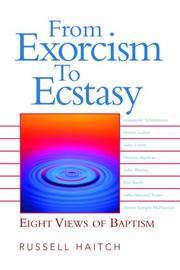| Listing 1 - 4 of 4 |
Sort by
|
Book
Year: 2022 Publisher: Milan FrancoAngeli
Abstract | Keywords | Export | Availability | Bookmark
 Loading...
Loading...Choose an application
- Reference Manager
- EndNote
- RefWorks (Direct export to RefWorks)
Since the central centuries of the Middle Ages the sacrament of penance became one of the central aspects of religious life and Christian practice. To help the clergy tasked with pastoral care in listening penitents’ confessions manuals were penned, which are to this day not much studied. The analysis of one of these texts, the De modo audiendi confessiones of Heinrich Lur, canon in the cathedral of Trento around the half of the fifteenth century, is the occasion to reflect on what in the late Middle Ages revolved around the administration of sacramental penance, in regards to theology and canon law as well as pastoral care.
Christian sacraments --- Christian ministry & pastoral activity --- Penance --- Sacraments --- Pastoral Care --- Confession --- Confessors’ Manual --- Absolution
Book
ISBN: 3402122677 3402122618 Year: 2021 Publisher: Münster : Aschendorff Verlag,
Abstract | Keywords | Export | Availability | Bookmark
 Loading...
Loading...Choose an application
- Reference Manager
- EndNote
- RefWorks (Direct export to RefWorks)
Based on current and projected breakthroughs in biological, genetic, and digital technologies—and their possible convergences—contemporary transhumanism confronts the Christian faith with the question: can finite beings be saved from suffering, illness and death? Transhumanists emphatically embrace this possibility as they offer their concrete visions of a future self-redemption through science, medicine, and technology. Transhumanism aims to take control of the evolutionary process and to steer it into a better future for humanity, or rather, their artificial successors. This book is a comprehensive and constructive critique of the transhumanist agenda and its underlying sociotechnical imaginary, worldview, and anthropology. For this task, it draws on theological resources of Christian tradition(s) in novel ways that serve to render the Christian faith plausible in a digital age. In developing a theology that explores the creative potential of “perfected finitude” (Vollendlichkeit) from an eschatological perspective, it contributes to a “theology of technology”. Das transhumanistische Anliegen, den Menschen in physischer und psychischer Hinsicht zu verbessern, hat eine lange Geschichte. Neu in der Gegenwart sind die Gestaltungspotentiale und Handlungsspielräume, die durch biologische, genetische und digitale Technologien eröffnet werden. Sie nötigen den Menschen zur Entscheidung: Wie kann, soll und will er sich als der „neue Mensch“ (homo novus) in Zukunft bestimmen (lassen)? In der Auseinandersetzung mit dieser Frage werden die Anliegen des Transhumanismus aus der Perspektive des christlichen Glaubens konstruktiv und kritisch diskutiert und mit einer zeit- gemäßen Techniktheologie konfrontiert, welche die Potentiale einer eschato- logischen „Vollendlichkeit“ von Mensch und Schöpfung entfaltet.

ISBN: 9780664230005 Year: 2007 Publisher: Louisville, Kentucky Westminster John Knox Pres
Abstract | Keywords | Export | Availability | Bookmark
 Loading...
Loading...Choose an application
- Reference Manager
- EndNote
- RefWorks (Direct export to RefWorks)
theology --- Christian sacraments --- baptism --- ritual --- exorcism --- ecstasy --- Alexander Schmemann --- John Howard Yoder --- Thomas Aquinas --- Martin Luther --- John Calvin --- John Wesley --- Karl Barth --- Aimee Semple McPherson
Book
Year: 2022 Publisher: Milan FrancoAngeli
Abstract | Keywords | Export | Availability | Bookmark
 Loading...
Loading...Choose an application
- Reference Manager
- EndNote
- RefWorks (Direct export to RefWorks)
Since the central centuries of the Middle Ages the sacrament of penance became one of the central aspects of religious life and Christian practice. To help the clergy tasked with pastoral care in listening penitents’ confessions manuals were penned, which are to this day not much studied. The analysis of one of these texts, the De modo audiendi confessiones of Heinrich Lur, canon in the cathedral of Trento around the half of the fifteenth century, is the occasion to reflect on what in the late Middle Ages revolved around the administration of sacramental penance, in regards to theology and canon law as well as pastoral care.
Christian sacraments --- Christian ministry & pastoral activity --- Penance --- Sacraments --- Pastoral Care --- Confession --- Confessors’ Manual --- Absolution --- Penance --- Sacraments --- Pastoral Care --- Confession --- Confessors’ Manual --- Absolution
| Listing 1 - 4 of 4 |
Sort by
|

 Search
Search Feedback
Feedback About UniCat
About UniCat  Help
Help News
News